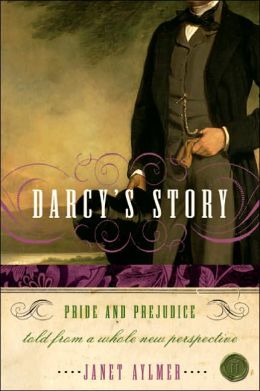Darcy's Story, by Janet Aylmer
Jun 16
2014

I am not picky about Jane Austen fanfic. Despite my frequent bookshelf purges, I have kept nearly a dozen Pride and Prejudice retellings, re-imaginings, and continuations of varying degrees of quality, so it's pretty telling that I will be sending my copy of Janet Aylmer's Darcy's Story off to its new home without a pang.
Darcy's Story retells the events of Pride and Prejudice from Darcy's point of view. It opens with Wickham's attempted elopement with Georgiana, and ends with Darcy and Elizabeth's marriage. While Ms. Aylmer attempts to fill in the long stretches of the original story where Darcy is not around Elizabeth, most of the book is devoted to his reactions to their scenes together—despite the fact that it's difficult to bring a fresh perspective to interactions that Austen described with such thoroughness.
Bluntly put, there's no point to this book. The author offers nothing new in her interpretation, and sticks mostly to making the story's subtext into text—like when Darcy tells Georgiana, “Although I do not always find our aunt Lady Catherine easy company, I have always shared her view that it is of primary importance to marry well, to seek an alliance with someone of our own consequence. Do you not agree?” While I've quibbled with previous Darcy POV stories (Mary Street's enjoyable The Confession of Fitzwilliam Darcy depicts Darcy as a seething cauldron of passion; Amanda Grange's Mr. Darcy's Diary features a downright evil Lydia), at least those authors attempted something new.
In addition to Aylmer's underwhelming storytelling, I had another complaint about Darcy's Story: in Austen's original novel, Darcy is civil, but no more than that, because he is arrogant enough to assume that any overt pleasantness to his social inferiors will lead them to assume that he wants a closer relationship with them. (He never questions whether or not they want a closer relationship with him.) His whole story arc is about learning to value himself less, and other people more. In Aylmer's version, Darcy is actively and aggressively rude. It's a small change, but a crucial one—it transforms Darcy from an overly proud but fundamentally decent young man to a straight-up jackass. It also appears to be Ms. Aylmer's only original thought, but I was totally unimpressed by it.
Darcy's Story retells the events of Pride and Prejudice from Darcy's point of view. It opens with Wickham's attempted elopement with Georgiana, and ends with Darcy and Elizabeth's marriage. While Ms. Aylmer attempts to fill in the long stretches of the original story where Darcy is not around Elizabeth, most of the book is devoted to his reactions to their scenes together—despite the fact that it's difficult to bring a fresh perspective to interactions that Austen described with such thoroughness.
Bluntly put, there's no point to this book. The author offers nothing new in her interpretation, and sticks mostly to making the story's subtext into text—like when Darcy tells Georgiana, “Although I do not always find our aunt Lady Catherine easy company, I have always shared her view that it is of primary importance to marry well, to seek an alliance with someone of our own consequence. Do you not agree?” While I've quibbled with previous Darcy POV stories (Mary Street's enjoyable The Confession of Fitzwilliam Darcy depicts Darcy as a seething cauldron of passion; Amanda Grange's Mr. Darcy's Diary features a downright evil Lydia), at least those authors attempted something new.
In addition to Aylmer's underwhelming storytelling, I had another complaint about Darcy's Story: in Austen's original novel, Darcy is civil, but no more than that, because he is arrogant enough to assume that any overt pleasantness to his social inferiors will lead them to assume that he wants a closer relationship with them. (He never questions whether or not they want a closer relationship with him.) His whole story arc is about learning to value himself less, and other people more. In Aylmer's version, Darcy is actively and aggressively rude. It's a small change, but a crucial one—it transforms Darcy from an overly proud but fundamentally decent young man to a straight-up jackass. It also appears to be Ms. Aylmer's only original thought, but I was totally unimpressed by it.
Posted by: Julianka
No new comments are allowed on this post.
Comments
No comments yet. Be the first!